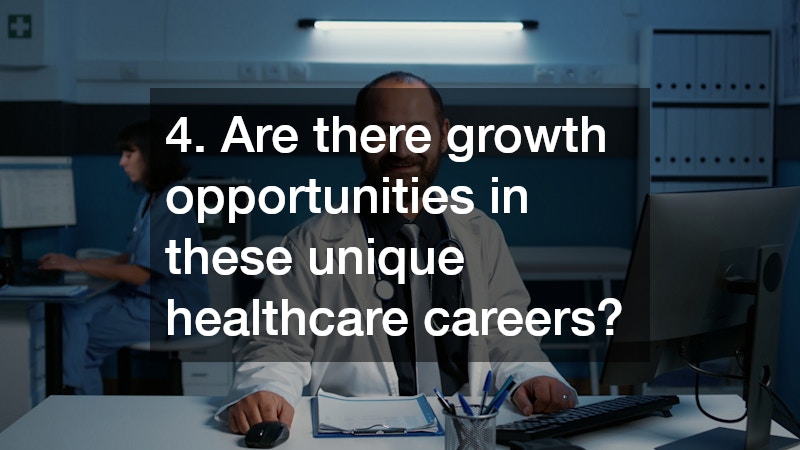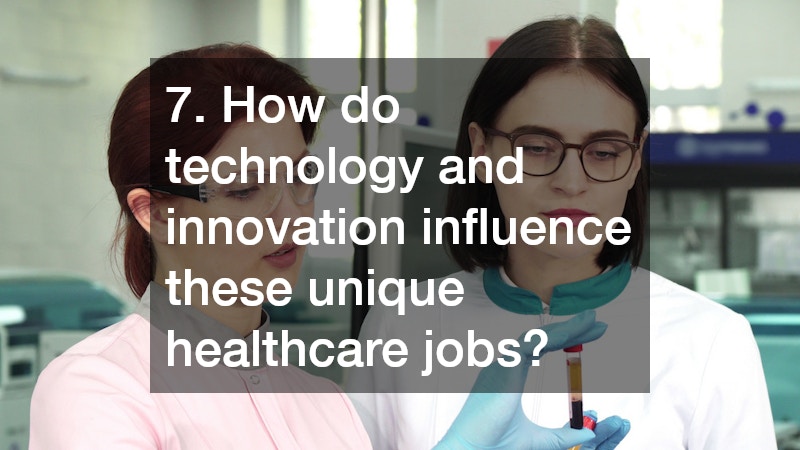

The healthcare landscape is an ever-evolving ecosystem driven by technological advancements, demographic shifts, and heightened expectations for patient care. Traditionally spotlighted roles like doctors and nurses undoubtedly serve as the backbone of this industry; however, there is a myriad of unique healthcare jobs that equally contribute in meaningful ways. These professions range from localized specialties such as the local pediatric dentist to ground-breaking fields that incorporate elements of technology, law, and environmental science. As we delve into these ten distinctive jobs, we shine a light on the multidisciplinary talents that supplement the medical field, going beyond the familiar to explore how these roles impact patient care and medical innovation. Through this exploration, it becomes increasingly evident that the future of healthcare lies not only in traditional medicine but also in the collaboration between these diverse professions.
1. What are some unique healthcare jobs you might not have heard of?

While the healthcare industry is teeming with well-known roles, there are distinct jobs that largely fly under the radar, such as the local pediatric dentist. These professionals specialize in the oral health of children, addressing unique dental needs that differ markedly from those of adults. Their role involves preventive care, education, and creating a comfortable environment for young patients, thereby setting the foundation for lifelong oral health.
Careers in ecotoxicology also represent an intersection of healthcare and environmental science. Ecotoxicologists study the impacts of toxic chemicals on human health and the environment, evaluating how pollutants can affect ecosystems and, subsequently, human populations. Through research and policy development, they contribute significantly to public health by preventing and controlling hazards.
Moreover, roles such as health informatics specialists leverage data and technology to optimize healthcare delivery. Health informatics involves the intelligent assimilation of data to improve patient care, develop predictive models, and enhance efficiency within healthcare systems. Each of these roles showcases the diversification of the sector and the plethora of unique healthcare jobs expanding the horizon of medical careers.
2. How do these unique healthcare jobs contribute to the medical field?
Unique healthcare jobs contribute profoundly to the medical field by addressing niche needs and augmenting traditional care paradigms. Consider the critical contributions of those working in assisted living environments; they offer holistic care to enhance the quality of life for elderly patients, often tailoring medical and social interventions specifically for geriatric needs. This personalized approach in assisted living settings significantly impacts patient outcomes.
Biostatisticians exemplify another crucial but less visible role, employing statistical analysis to interpret vast datasets and inform clinical research. Their work helps in understanding the effectiveness of medical treatments, predicting health trends, and guiding policy decisions. In a data-driven era, biostatisticians enable evidence-based practice, underpinning advancements in patient care protocols.
Additionally, pharmaceutical flooring specialists contribute by creating safer hospital environments. By designing and implementing antimicrobial and easy-to-maintain flooring solutions, they help prevent the spread of infections within medical facilities. Their unique skills thus play an undeniable part in maintaining the hygiene standards necessary to ensure patient safety.
3. What qualifications are needed for these unique healthcare positions?
The qualifications for unique healthcare jobs vary widely depending on the role. For a local pediatric dentist, the path requires extensive dental education followed by specialized training in pediatric dentistry. Prospective dentists must complete dental school and a residency program focusing on children’s dental care, encompassing child development, child psychology, and dental trauma management.
In contrast, pharmaceutical flooring experts often require formal training in material sciences along with hands-on experience in installation and safety procedures. They must be well-versed in hygiene regulations and the chemical properties of flooring materials to implement durable, safe solutions. Additional knowledge in infectious disease control adds value to their expertise.
Ecotoxicologists generally hold advanced degrees in environmental sciences or related fields and may undertake focused certifications pertinent to toxicology. Their academic journey encompasses disciplines like chemistry, biology, and environmental policy. A strong grasp of analytical methods is pivotal, as is effective communication for policy influence and public health initiatives.
4. Are there growth opportunities in these unique healthcare careers?

Growth opportunities abound in many unique healthcare careers as the demand for specialized skills burgeons with medical advancements. For instance, the field of ecotoxicology is experiencing a surge, driven by increased global awareness of environmental risks affecting public health. Those in this profession can expand their roles into advisory positions, government bodies, or international organizations focused on ecological policies.
A career in health technology management, which encompasses managing complex medical systems, presents ample expansion prospects. Innovations in digital health and telemedicine propel opportunities for professionals to develop systems that improve healthcare accessibility globally. As technology integration in healthcare persists, upward mobility within such tech-centric roles is likely.
Unique roles in pharmaceutical flooring also promise growth as hospitals continue to prioritize infection control infrastructure. Specialists in this domain can advance into project management, consulting, or product development roles within manufacturing companies, steering innovations in healthcare facility design. Overarching trends indicate a favorable growth trajectory for professionals across these distinctive healthcare sectors.
5. How do unique healthcare jobs impact patient care differently?
Unique healthcare jobs impact patient care distinctly by providing specialized attention tailored to specific needs. For example, esthetician school graduates specializing in medical aesthetics offer treatments that go beyond cosmetic improvements, playing a critical role in patient rehabilitation post-surgery or injury. Their work enhances self-esteem and recovery times, notably improving quality of life.
In assisted living facilities, personalized care plans crafted by geriatric care managers address the complex health dynamics of aging populations. Their role is instrumental in medical decision-making, considering both physical and emotional health needs. This holistic approach results in enhanced patient satisfaction and well-being.
Moreover, medical interpreters facilitate effective communication between healthcare providers and non-English speaking patients. By ensuring accurate communication, they mitigate potential misunderstandings, enhancing patient compliance and safety. Their unique contributions ensure inclusivity and equality in healthcare delivery, showcasing a direct positive impact on patient care.
6. What is the job outlook for these unique healthcare roles?
The job outlook for various unique healthcare jobs is promising, largely propelled by demographic changes and pointed innovations in the field. Medical malpractice attorneys, who specialize in cases involving non-conventional medical errors and emergent treatment technologies, are seeing burgeoning demand as healthcare systems evolve. These attorneys play a vital role in maintaining medical accuracy and accountability.
Pharmacy informatics specialists are observing significant demand fueled by electronic health records and integrated health systems that necessitate adept data management across healthcare environments. As digital health usage rises, so does the need for professionals who can accurately interpret and utilize data. This is indicative of an expanding job market for individuals with informatics expertise.
Moreover, continuous advancements in medical technology portend a strong demand for biomedical equipment technicians. These professionals, who are responsible for the maintenance and repair of critical medical devices, contribute significantly to patient safety and care standards. Overall, the career prospects for these unique roles offer both stability and advancement possibilities.
7. How do technology and innovation influence these unique healthcare jobs?

Technology and innovation are indelible components of unique healthcare jobs, driving enhanced efficiency and effectiveness in patient outcomes. For example, the role of healthcare technologists in premises liability law involves ensuring medical facilities meet safety regulations through advanced monitoring systems. A premise liability law attorney works in legal compliance and risk management, reduces liabilities, and promotes safe patient environments.
Innovations in telemedicine and remote patient monitoring are transforming the delivery of healthcare services, making roles like telehealth coordinators more prevalent. They manage remote healthcare services, connecting patients and doctors virtually to improve healthcare access and patient care continuity. This innovation is particularly impactful in underserved or remote areas.
Furthermore, automated systems and AI diagnostics have revolutionized biomedical engineering. This field now encompasses the design and development of automated surgical robots, enhancing surgical precision and reducing human error. Advancements in these areas underscore the diverse ways technology propels unique healthcare jobs forward.
8. What are the challenges faced by professionals in these unique healthcare roles?
Despite their importance, unique healthcare jobs come with inherent challenges that professionals must navigate. The rapidly changing nature of healthcare technology poses a constant challenge to those in tech-centric roles, requiring continuous learning and technology adaptation. Completing ongoing online safety training becomes crucial in staying updated.
Massage therapy training, though valuable for rehabilitation and pain management, is often undervalued in traditional medicine settings. Therapists may face obstacles in gaining recognition for their contributions to patient care, necessitating advocacy for integrative health approaches. Overcoming such barriers involves educating stakeholders on the scientific benefits of alternative therapies.
Those working in legal specializations must contend with evolving medical regulations and ethical considerations. For instance, professionals involved in premise liability law or as a medical malpractice attorney must stay informed of legal changes that can impact practice standards. The complexities of navigating the intersection between law and healthcare require keen analytical and communicative abilities.
9. How does one get started in a unique healthcare specialty?
Embarking on a career in unique healthcare jobs typically begins with focused education and specialized training. Many professions require dedicated programs, such as an injectable course for those interested in medical aesthetics or dermatology, supplying specialized skills necessary for advanced practice. Certifications further enhance professional credibility in specialized niches.
Online safety training serves as a foundational tool for those entering tech-savvy or regulatory roles within healthcare. Understanding privacy laws, data protection, and cybersecurity principles is paramount in cultivating a skill set that aligns with modern healthcare environments. Prospective professionals should also consider internships or mentorships to gain industry-relevant experience.
Networking and participation in pertinent conferences or workshops help aspirants stay connected with industry trends and opportunities. Engaging with professional organizations offers avenues for career development and continuing education, essential for maintaining competitiveness in unique healthcare fields.
10. What are some of the most rewarding aspects of working in unique healthcare jobs?

Working in unique healthcare jobs can be exceptionally rewarding, providing opportunities for innovation, collaboration, and direct impact. Roles like those of a local pediatric dentist not only allow professionals to cater to essential child health needs but also foster lasting relationships with community families. A focus on preventive care ensures long-term benefits for young patients.
Healthcare roles involving patient interaction, such as those held by estheticians trained from esthetician school, offer transformative effects on patients’ lives, rendering aesthetic improvements that boost confidence and emotional well-being. Enhancing patient perceptions of themselves can drive profound health behavior changes and ensure lasting wellness impacts.
Professionals who engage in interdisciplinary field roles like ecotoxicology experience the gratification of influencing policies that guard public health and environmental integrity. Their work serves humanity by preventing health risks associated with toxic exposures, ensuring sustainable living conditions. Such an enduring legacy highlights the rewarding nature of unique healthcare professions.
Understanding These Unique Healthcare Jobs
The dynamic landscape of healthcare continues to evolve with the integration of distinctive roles that complement traditional medical careers. Exploring the wide array of unique healthcare jobs reveals a world of opportunities for those passionate about influencing patient care in innovative ways. Whether in localized roles like a local pediatric dentist or expansive fields like ecotoxicology, each contributes uniquely to the overarching tapestry of the medical community.
By delving into these specialized careers, individuals can harness their skills and interests to become pivotal players in the ever-advancing world of healthcare. Such exploration not only paves the way for fulfilling career paths but also enriches the industry’s capabilities to adapt to future challenges. The future of healthcare will undoubtedly be shaped by these diverse roles that exemplify dedication, innovation, and cross-disciplinary collaboration.
As technological integration and societal changes continue to influence medical practices, the importance of recognizing, supporting, and advancing these unique healthcare positions cannot be overstated. Through insight and education, the potential for growth within these professions remains boundless, inviting new possibilities in medical innovation and improved patient experiences. These roles also play a crucial part in creating more efficient, patient-centered care models that can respond dynamically to emerging healthcare needs. If you have any questions, reach out to a local healthcare provider.


